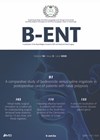
Journal Reviews
Impact of delaying otologic surgery
In this Belgian study, the authors looked at the impact of delaying otologic surgery by sending an online survey to 44 adult patients diagnosed with benign ear pathology whose surgery was postponed due to the COVID-19 pandemic. The questionnaire was...
Why do some people get their smell back so quickly after a COVID infection whilst others don’t?
Of course, we are all too familiar with the effect that COVID-19 infection has on our sense of taste and smell, but why do most patients get better whilst, for many, the misery lingers on and on? This paper looks...
How patients reacted to postponement of cochlear implant surgery due to COVID-19
The onset of COVID-19 in 2020 required widespread cancellation of elective surgeries, one of these being cochlear implant for profoundly deafened adults and post-lingually deafened children. Through a questionnaire, to which 23 out of 38 patients responded, this qualitative study...
Nasopharyngeal versus nasal swabs for COVID-19
This systematic review from Austria compares nasopharyngeal swab (NPS) and PCR test to nasal swabs from the other nasal areas with PCR. After finding 425 articles, using PRISMA guidelines 18 were deemed suitable for comparison. Anterior nasal swabs (ANS) and...
Olfactory and gustatory recovery in coronavirus patients after six months
It remains unclear for how long olfactory and gustatory losses persevere in patients with COVID-19. This is a prospective study of 300 patients who lost taste and smell within seven days of contracting COVID-19. The patients were objectively assessed with...
How safe is sinonasal surgery for the operating surgeon in times of COVID-19?
I’m sure we have all wondered how safe we are in the operating theatre from virus circulating in the room and therefore the risk of subsequent COVID-19 infection. The authors addressed this by measuring the airborne particle concentrations in the...
Olfactory disorders in COVID-19
This Turkish prospective longitudinal observational study evaluated olfactory disorders (OD) and recovery processes in patients with COVID-19 infection at three time points within the first month of diagnosis: time of diagnosis with positive PCR test; time of first negative PCR...
COVID-19 in patients with chronic rhinosinusitis with polyps. Are they at risk?
COVID-19 entry factors are highly present in nasal epithelial cells. These factors include ACE2 and TMPRSS2. Their presence in patients with chronic rhinosinusitis with nasal polyps (CRSwNP) was not investigated before. Authors investigated expression of ACE2 and TMPRSS2 in two...
Audiology and COVID-19
COVID-19 affected all clinical services in a very short time, including audiology. This service improvement investigation concentrated on how audiology services in the UK were impacted by the virus and how perception of tele-audiology changed. About 120 practising audiologists were...
Telepractice in COVID-19 and beyond
COVID-19 has suddenly forced health professionals to switch from face-to-face to remote video conferencing to deliver many or most of their services. This article considers the current state of this service delivery model (also called telepractice) for speech and language...
Nasal function in COVID-19 patients
This Turkish prospective study compared SNOT-22 outcomes as well as objective assessments of nasal secretion and clearance in 40 patients who tested positive on COVID-19 antigen PCR testing and 40 patients who tested negative. Sinonasal findings were assessed using a...
Loss of smell in the age of COVID-19
Loss of smell (LOS) is a debilitating symptom with increasing interest for the medical community due to its high prevalence in COVID-19. In the present paper, a team of 15 experts provide recommendations for the investigation and management of patients...














